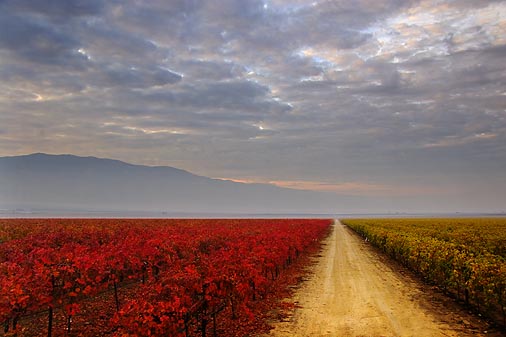Soul journey: A trip to an enigma at the heart of legal education
This is a very long and ambitious post. Because MoneyLaw enjoys the services of Gil Grantmore, the legal blogosphere's finest disembodied webmaster, it will contain extraordinary amounts of visual and audio information. I will proceed in three steps:

- An introduction to Gillian Welch, one of my favorite musicians
- A psuedo-synesthetic presentation of Wrecking Ball
 , the final cut on Gillian Welch's 2003 album, Soul Journey
, the final cut on Gillian Welch's 2003 album, Soul Journey - A discussion of an enigma at the heart of contemporary legal education
Read the rest of this post . . . .1. Gillian Welch
Readers of other Jurisdynamics Network blogs may have noticed my fondness for Gillian Welch, especially her masterful expressions of contemporary musical naturalism. Why do I love Welch's music? Because listening to it is quite literally a religious experience:
(Bill Baue for Killing the Buddha.)Without knowledge of Welch’s biography, we might mistake her for a child of Appalachia. Her music echoes that high lonesome sound: interwoven instrumentation braided around intertwining vocal harmonies. Her lyrics lean heavily on old time Appalachian themes: the grief of loss, the imprisonment of addiction, the degradation of labor, the violence of desire, the attraction of evil, the joy of redemption.
Some have criticized Welch upon learning she wasn’t born in the shadow of the Clinch Mountains of Virginia, but of the Empire State Building. Worse yet, she grew up in L.A., hanging out in the CBS studios where her parents wrote music for the Carol Burnett Show. How could a child of privilege presume to sing songs of deprivation and depression?* * * * *
By drawing on events and images we all share, Welch not only invites listeners onto common ground, but she also avoids the charge that she is treading on the sacred territory of gospel music as a non-believer, nor on the hallowed grounds of Appalachian music as a flatlander. She rightfully claims all Americana as her religion.
2. A psuedo-synesthetic presentation of Wrecking Ball

Gillian Welch, Wrecking Ball |
  |
| A little deadhead . . . playing bass under a pseudonym |
  |
| Farmer in the Pogonip . . . colors I'd never seen |
 |
| The Santa Cruz Garden Mall |
3. An enigma at the heart of legal education
I chose this song for two reasons. The first is obvious: I like it. Its musical and lyrical complexity explains the second reason. Wrecking Ball is virtually impossible to understand on one hearing, or even four or five. Its rich lyrics are dense with references to central California — especially the San Joaquin Valley and Santa Cruz — and to cultural events spanning the Vietnam era to the 1989 San Francisco earthquake. As someone whose lifetime presence in California is most readily measured in days rather than weeks, months, or years, I had to work unusually hard to appreciate this song, and the presentation above translates my efforts into a montage of images, words, and sounds.
And even then, an ambiguity remains. The word pogonip invites two interpretations. In the ordinary sense, pogonip means either:
- Dense fog of suspended ice particles; an Indian word for the formation of frost on trees but not on the ground; etymology, Shoshone pakenappeh . . . which means "white death" [or "cloud"].
- Pogonip, or "ice fog", results in a phenomenon called "hoarfrost," which is a deposit of interlocking ice crystals on objects exposed to cold, foggy air. Dazzling winter scenes are revealed as tree limbs, leaves, fence wires are coated with the ice.

 All this makes eminent sense, but for one small detail. The Santa Cruz area has a park named Pogonip. In the geographic context of the song, this is the probable interpretation. It took a lot of Googling, but I think I finally nailed it.
All this makes eminent sense, but for one small detail. The Santa Cruz area has a park named Pogonip. In the geographic context of the song, this is the probable interpretation. It took a lot of Googling, but I think I finally nailed it.We finally reach our MoneyLaw payoff. The actual practice of law — which, at last notice, is the reason most students attend law school — is a profoundly local activity. Mastering it requires local knowledge several orders of magnitude more intense, and more important, than the deep meaning of a Gillian Welch song. Unsurprisingly, the student and alumni populations of most law schools have a distinctly local flavor. Where you go to school and where you will eventually practice correlate very strongly.
That geographic overlap is nowhere to be found on most law school faculties. Law school professors are drawn from a national, even international, pool. Moreover, no ambitious law professor today wants to be typecast as a "regional" player, let alone anchored to a single locality. In my experience, relatively few professors invest deep amounts of emotional capital in communities where, they imagine, they will live for only a few years before moving on. Personal preferences and family obligations do intervene, of course, but by and large our profession consists of uprooted individuals, ready and willing to become fugitives and vagabonds in the earth for the sake of some professional advantage, any advantage, at the margin.
Given what (I thought) we are supposed to accomplish, which is to teach our students and to prepare them for their lives in the law, the geographic mismatch between law students and their professors strikes me as an enigma. I must ask:
Why?













5 Comments:
I think in that song Welch means she (or her narrative persona, anyway) farmed marijuana, see #3 here:
http://www.urbandictionary.com/define.php?term=Pogonip
Dean Chen,
Quite a stirring post--I started a comment but it turned into a full-on moneylawyer post of my own, so I'm gonna edit it and post it later today. Might the knowledge of the "local practitioner" might be a measurable, undervalued commodity in certain kinds of litigation?
moneylawyer
I was just in the process of creating a complete annotated version of Wrecking Ball myself... stumbled on your site. Funny how she seems to inspire Dylan like obsessions with what their songs "really" mean.
Yes, in the context of Deadheads, this European with no intimate knowledge of California had decided she referred to marihuana.
I don't know about Dylan-like obsessions, but this song itself is certainly Dylanesque.
Beware the Pogonip.
Post a Comment
<< Home